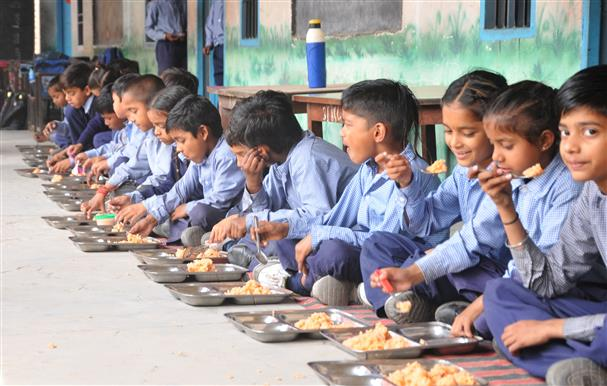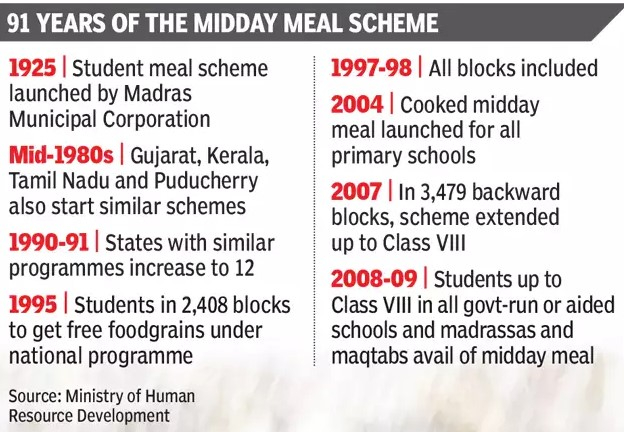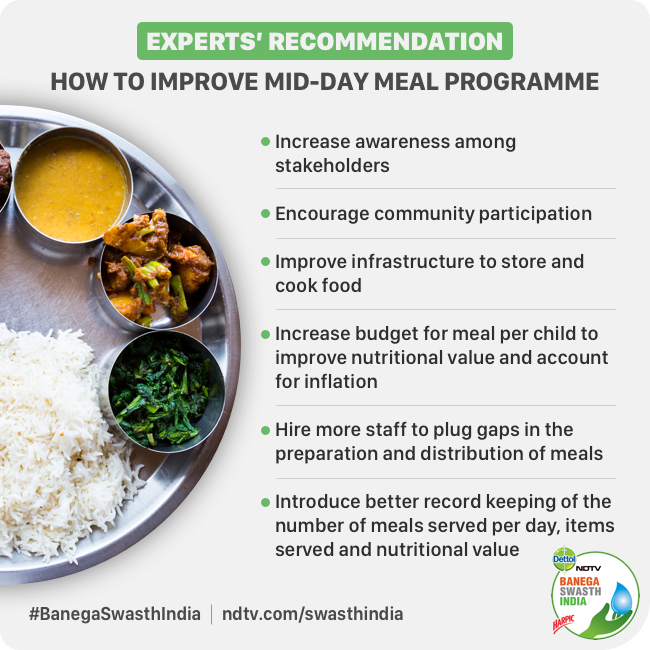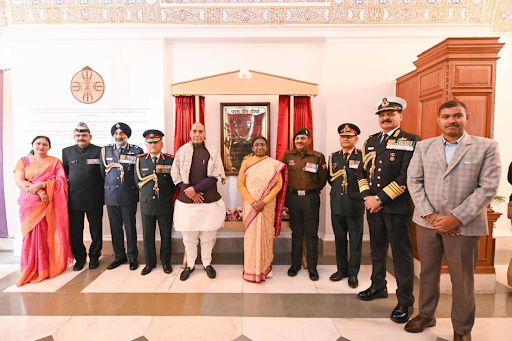Description

Copyright infringement not intended
Picture Courtesy: https://www.tribuneindia.com/news/haryana/state-hikes-mid-day-meal-budget-by-72-494975
Context: The Indonesian delegation explores collaboration with India on socio-economic initiatives, including a mid-day meal scheme and digital inclusion, fostering mutual growth and development in various sectors.
Details
- The Indonesian delegation visited India to explore collaboration in key areas such as biotechnology, digital inclusion, and agriculture. One of the primary objectives of the visit was to study India's mid-day meal scheme, the world's largest free school lunch program, to implement a similar initiative in Indonesia.
- The visit emphasised collaboration in areas such as reducing marine debris, aquaculture, biotechnology research, digital public infrastructure, and sustainable energy.
- The delegation also explored opportunities for cooperation in blue economy initiatives, particularly in the field of seaweed farming and renewable energy.
- The visit has opened new avenues for collaboration, with discussions on potential joint research programs, student exchanges, and technology transfer initiatives.
Potential collaboration
- Mid-day Meal Scheme: Indonesia is interested in adopting a program similar to India's Mid-day Meal Scheme, which provides free lunches to millions of school children. This scheme aligns with the goals of President-elect Prabowo's manifesto.
- Digital Inclusion: Indonesia recognizes the importance of digital access for its citizens and wants to improve its digital infrastructure. They are interested in learning from India's Jan Dhan Aadhar Mobile (JAM) trinity, a system that connects bank accounts, unique ID numbers (Aadhar), and mobile phone numbers. This digital infrastructure played a crucial role in delivering benefits directly to people during the COVID-19 pandemic.
- Biotechnology: Discussions included research and development, with a focus on India's Biotechnology Industry Research Assistance Council (BIRAC) and its role in the Indian biotech startup ecosystem.
- Agriculture: Both countries see opportunities in areas like reducing marine debris, aquaculture, and biofuels.
- Blue Economy: Indonesia, which launched the world's first large-scale mechanised seaweed farm in 2024, is keen to explore collaboration related to seaweed production.
|
The visit highlights the potential for increased cooperation between India and Indonesia. They share similar challenges in balancing economic growth with social inclusion. By working together, they can address these challenges and achieve their Sustainable Development Goals related to food security, green energy, and inclusive development.
|
Midday Meal Scheme (MDMS)
- The Midday Meal Scheme (MDMS) is an initiative launched by the Indian government in 1995. It tackles the crucial issue of childhood hunger by offering a free, hot lunch on every functioning school day.
- The MDMS caters to children between the ages of 6 and 14, specifically enrolled in Class 1 to Class 8 in government, government-aided schools, and select other institutions.
- The program provides a balanced and filling meal, with the specific composition varying slightly based on the age group and state. This could include rice, lentils, vegetables, fruits, eggs, or milk, aiming to fulfil crucial nutritional requirements.

Why it Matters?
- Combating Malnutrition: India faces a significant challenge with childhood malnutrition. The MDMS tackles this directly by ensuring children receive regular, nutritious meals, contributing to their healthy physical and mental development.
- Boosting Education: The promise of a free lunch acts as a powerful incentive for parents, especially those from underprivileged backgrounds, to enrol their children in school. This leads to higher enrollment rates, improved attendance, and a reduction in dropout rates.
- Promoting Equality: The scheme provides meals irrespective of caste, religion, or socioeconomic background. This fosters social equity within schools, ensuring all children have access to basic sustenance and equal opportunities to learn.
- Empowering the Future: Improved nutrition, coupled with education and social interaction in schools, empowers children. This holistic approach contributes to their overall development and paves the way for better future prospects.
Challenges to Overcome
- Quality and Hygiene: Maintaining consistent standards of food quality and hygiene across a vast network of schools and kitchens nationwide can be difficult. Regular inspections and stricter guidelines are crucial.
- Logistics and Infrastructure: Delivering meals efficiently requires robust logistics and adequate infrastructure, especially in remote areas. Constant investment and innovative solutions are necessary.
- Corruption and Leakages: Instances of corruption or diversion of funds allocated for the scheme can cripple its effectiveness. Stricter monitoring and accountability mechanisms are essential.
- Monitoring and Evaluation: Implementing robust monitoring and evaluation systems allows for pinpointing issues related to the program's execution and impact. This ensures continuous improvement and adaptation.
Steps Towards a Brighter Future
- Stricter Regulations and Monitoring: Developing and enforcing stricter guidelines along with strengthened monitoring mechanisms helps ensure consistent quality and hygiene standards.
- Community Involvement: Encouraging the participation of local communities and NGOs in the program's implementation can enhance transparency, accountability, and community ownership.
- Tech for Efficiency: Exploring technological solutions like real-time monitoring systems and logistics management tools can improve efficiency and transparency.
- Public-Private Partnerships: Collaborating with NGOs and private organisations can leverage their expertise and resources to improve the scheme's reach and effectiveness.

The Road Ahead
The MDMS is a dynamic program with continuous efforts needed to ensure continued success. Some potential areas for future improvement include:
- Nutritional Upgradation: Tailoring meals to address specific regional dietary needs and micronutrient deficiencies can further enhance their nutritional impact.
- Building Capacity: Investing in training programs for cooks and personnel involved in food preparation and delivery ensures better food handling practices and efficient service.
- Sustainability: Exploring sustainable models for sourcing ingredients and managing food waste can not only reduce costs but also promote environmental consciousness.
Conclusion
- The Midday Meal Scheme is a powerful tool for addressing childhood hunger, promoting education, and fostering social equity in India. By acknowledging the challenges and actively working towards solutions, the government can ensure that the MDMS continues to fulfil its potential and empower generations of young minds.
Must Read Articles:
PM-POSHAN SCHEME
Source:
THE ECONOMICS TIMES
|
PRACTICE QUESTION
Q. Despite good intentions, government programs can face issues of inefficiency and corruption. How susceptible is the Midday Meal Scheme to these problems? Discuss challenges in monitoring fund allocation, food quality, and delivery across various states in India. Propose potential solutions to ensure transparency and accountability.
|












